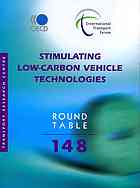

Most ebook files are in PDF format, so you can easily read them using various software such as Foxit Reader or directly on the Google Chrome browser.
Some ebook files are released by publishers in other formats such as .awz, .mobi, .epub, .fb2, etc. You may need to install specific software to read these formats on mobile/PC, such as Calibre.
Please read the tutorial at this link: https://ebookbell.com/faq
We offer FREE conversion to the popular formats you request; however, this may take some time. Therefore, right after payment, please email us, and we will try to provide the service as quickly as possible.
For some exceptional file formats or broken links (if any), please refrain from opening any disputes. Instead, email us first, and we will try to assist within a maximum of 6 hours.
EbookBell Team

4.0
6 reviewsGovernments around the world are increasingly intervening in automobile markets to improve fuel economy and reduce emissions of CO2 from new vehicles. This report reviews the rationale for such intervention and examines measures for maximum effectiveness and minimum cost. The Round Table brought together economists, policy makers and auto engineers with the aim of advancing understanding of why car markets currently fail to deliver sufficient fuel economy. it started by questioning whether any additional measures would be necessary once an appropriate price for carbon dioxide is established via fuel taxes. it confirmed that there are indeed market imperfections that merit additional government intervention. Fuel economy and CO2 regulations are an essential part of the package. The key to maximising the benefits of such regulations is long-term planning. The longer the timeframe, The less industry investment is handicapped by uncertainty. Subsidies to electric vehicles are more problematic because of the risks of prematurely picking winning technologies and creating subsidy dependence. And electricity production has yet to be decarbonised. However, intervention to steer innovation in this direction is merited so long as the risks of not attaining climate policy targets are seen as higher than the risks of intervention.